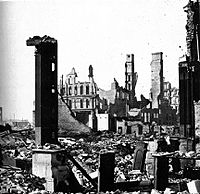The Chicago of 1871 was living on the edge of disaster. Growing far faster than city services, water borne diseases and epidemics were on the rise. Unsafe structures abounded in the city. Most residents lived in dilapidated dwellings. The city, while growing, was also dying. Some reformers recognized this and called for action. Others saw the issues but hoped for the best -- that the city would be able to survive and thrive despite its issues, contrary to common sense.
In the end, a near total destruction of the city brought about a vibrant new era. Post-fire Chicago had the opportunity to rebuild completely, utilizing new materials, such as fireproof steel, in major buildings, creating city plans for water, lighting and transportation, and developing new building styles that would make Chicago renowned around the world for its variety of unique and exquisite architecture.
In other words, destruction needed to take place to bring about change. I have been pondering whether this is the case for many Lutheran schools. Many schools are living in the patterns of the past, recognizing that the world is changing around them, but hoping to survive -- hoping for the best. In short, they act like the Chicago of 1871.
In my view, many of these schools will not survive. While this is heartbreaking on many levels, especially for those schools which have significant institutional histories, perhaps this is necessary in order for them to be re-built. Instead of rebuilding with steel, we can rebuild schools with flexible structures and governance, emphases on collaboration, project-based learning, increased student ownership of learning and inquiry, that better model real work experiences. These are needed to be able to share the timeless truths of God, His love, and His forgiveness and salvation to our Digital Age world and culture. We can adapt or rebuild with educational opportunities that leverage digital and online tools, with flexible face-to-face, blended, and online models, meeting the needs of each uniquely gifted child of God in very personal ways.



One of the greatest assets we have in Lutheran education is our ability to "weather the storm" of trends. I believe we've consistently been able to be discern what to take away from and what to let of with regards to educational progressiveness. Too often, however, I think many Lutheran schools believe that the tools of the digital age are just fads, or another educational "storm" that needs to be weathered.Or worse yet, they are just biding their time until retirement!
ReplyDeleteReminds me of the quote by Davidson and Goldberg from "The Future of Learning Institutions in a Digital Age" (2009): "our learning institutions, for the most part, are acting as if the world has not suddenly, irrevocably, cataclysmically, epistemically changed- and changed precisely in the area of learning."
I pray our Lutheran school colleagues recognize, and have the courage, to train up a generation which desperately needs the Gospel in light of the ever-changing world.
Thank you for continuing to shine encouragement on Lutheran schools as we make our way through these transformative days!
Keep up the good work!